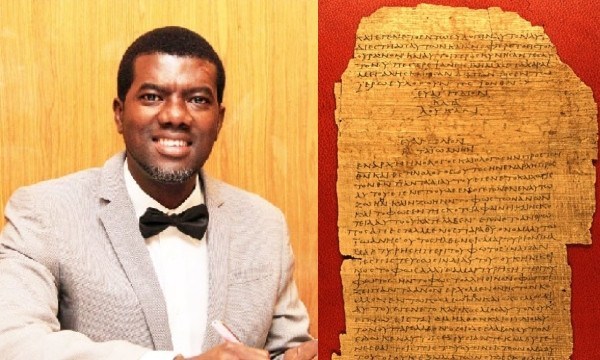Historical plots have always been subject to revisionism from ages past. But, any revisionist can get away with his revisionism, provided there is no evidence to kick against whatever nonsense he is gunning for.
Not long ago, a Nigerian political and social commentator, who doubles as Pastor of the mind of Christ church, Reno Omokri, gave some often repeated arguments (shocking only to those who have not come across online polemicism targeted at Christianity, which are for the part, baseless in the face of evidence) against the doctrine of the Trinity and historicity of Jesus’s name.
One would think he is just discovering a gold mine, when he in fact is merely rehearsing arguments that has been in the skeptical (but un scholarly front against Christianity from the 19-20th century. I want to believe Reno’s argument has nothing to do with Jesus mythicism, hence I will limit my argument to the obvious part of his assertions. I will in this article give responses to the point raised on his posts as vividly as I can.
“People erroneously think Jesus is the Greek translation of Yeshu’a. That is not true. Jesus is a VERSION of Yeshu’a. But it is not a TRANSLATION. The name Yeshu’a is short for Yehoshu’a. It means the Lord saves. In Greek, the literal translation of Yehoshu’a or Yeshu’a is “Theós sózei sózó’ is the Greek word for salvation’.
The problem with this assertion is that Reno wrongly thought the transliteration of the Hebrew word “Yeshua’ (jeˈʃuaʕ) or its variant, “Yehoshua’ (jəhoˈʃuaʕ), which means “Salvation of the Lord’ and “Theo’s sozo’ would necessarily have an effect on the way the average first century Greek speaker would’ve named Jesus. “Theo’s sozo’ which means, “the salvation of God’, and is still the same meaning if transliterated to the Greek word for “iesous’. I wonder why he think the meaning of a name should necessarily be used for its translation as it is used through languages. It’d be interesting to note that it wasn’t only in the gospels or the new testament that we have the name Yeshua, rendered as “iesous’ in Greek. The Septuagint, a Greek translation of the old testament before Jesus’s time used the word “iesous’ the son of Naue for Joshua son of Nun, which is a variant of Jesus.
In the writings of Josephus (the first century Jewish aristocrat) and Philo of Alexander, Yeshua was transliterated as “iesous’, and hence, not used exclusively by New testament writer (which might have created suspicion of any form as to its origin). Perhaps, it needs to be sounded quite loudly that the meaning of a word wasn’t necessarily the rule applicable for name transliteration in greek translation. Just like we have in case of a name like Abraham, which when the meaning is translated in Greek is, “pathera pollon ethnon’, i.e Father of many nations, but has the name as “Abraam’ in Greek, and Hebrew, “Avraham’, the same applies to the name “iesous’ pronounced as “ye-o-sous’, or Yeshua in Hebrew. Why did the ancient Greek speaker not just call Abraham by the name, “pathera pollon ethnon’, but chose to call him Abraam?
Meanwhile, there are expansive archaeological evidence pointing to the use of the name among the second temple Jews. In the documentary The Lost Tomb of Jesus, archaeologist Amos Kloner stated that the name Yeshua was then a popular form of the name Yehoshua and was “one of the common names in the time of the Second Temple. In discussing whether it was remarkable to find a tomb with the name of Jesus (the particular ossuary in question bears the inscription “Yehuda bar Yeshua”), he pointed out that the name had been found 71 times in burial caves from that time period’.
It was the Greek word “iesous’ that’s transliterated to Jesus in the English alphabet, by the exchange of “i’ with “J’. In translating from one language to the other, it can get a little tricky, as names are sometimes rendered based on sound. The Greek word, “iesous’ was rendered as Jesus likely due to the inability of English native speaker to pronounce the Greek form without much difficulty. The pronunciation could be made easier only by replacing the letter “I’ with ” J’, and hence, how “iesous’ as a name becomes Englishi-zed. That fits nowhere near any western conspiracy as Reno and others may want to have people believe. Rather, it shows the manner of evolution of name via sounds pattern as has even been seen in other languages, hereby, not exclusive to English or the Greek.
To sparingly address his second claim which, appear to be unimportant, to quote Reno directly, he said:
.
“Some people say that European occultists came up with the name Jesus because it is similar to the name Zeus, who was the head of the Greek Pantheon of gods. I don’t know if that is true. What I know is that I went to the Temple of Zeus, in Greece, myself to investigate and what I found out is that Zeus had a son with a human woman called Dionysius or saviour, and his birthday is celebrated at the end of December, during the winter solstice (between December 25-30). He was considered the link between the living and the dead. And very importantly, he died and was resurrected by his father, Zeus. Please Google this information yourself. The attached picture was taken on January 29, 2019 at the Temple of Zeus in Greece’
.
It’s even good Pastor Reno Omokri (if I will be charitable to use that title) at least admitted ignorance in the matter involving Greek mythology and its relation to Jesus of Nazareth, otherwise, I could just have brand him an upcoming Mythicist on the same par with the Richard Carrier of this world. Meanwhile, there is no satisfactory evidence dating back to the period before Jesus supporting the position that Zeus was born in December 25. Such an assertion is dead on arrival just like the parallel of Isis, Horus, Mithras been drawn by online Jesus mythicist.
And even if one were to for the sake of argument grant the parallel as being evidence of the parallel of the name (which is at best laughable even), there is no evidence within the new testament trying to posture such a thing as officiating Jesus’s birthday as December 25. And such an assertion would just be nothing more than the text book fallacy of correlation implies causation if there was a parallel.
Since, it appear Reno Omokri already made an adjustment of his position about whether or not Jesus view himself as God, I will not attempt to include that in this particular article, but will most certainly do in subsequent one.




Great piece
Thanks Emmanuel.
Wow, what a great piece